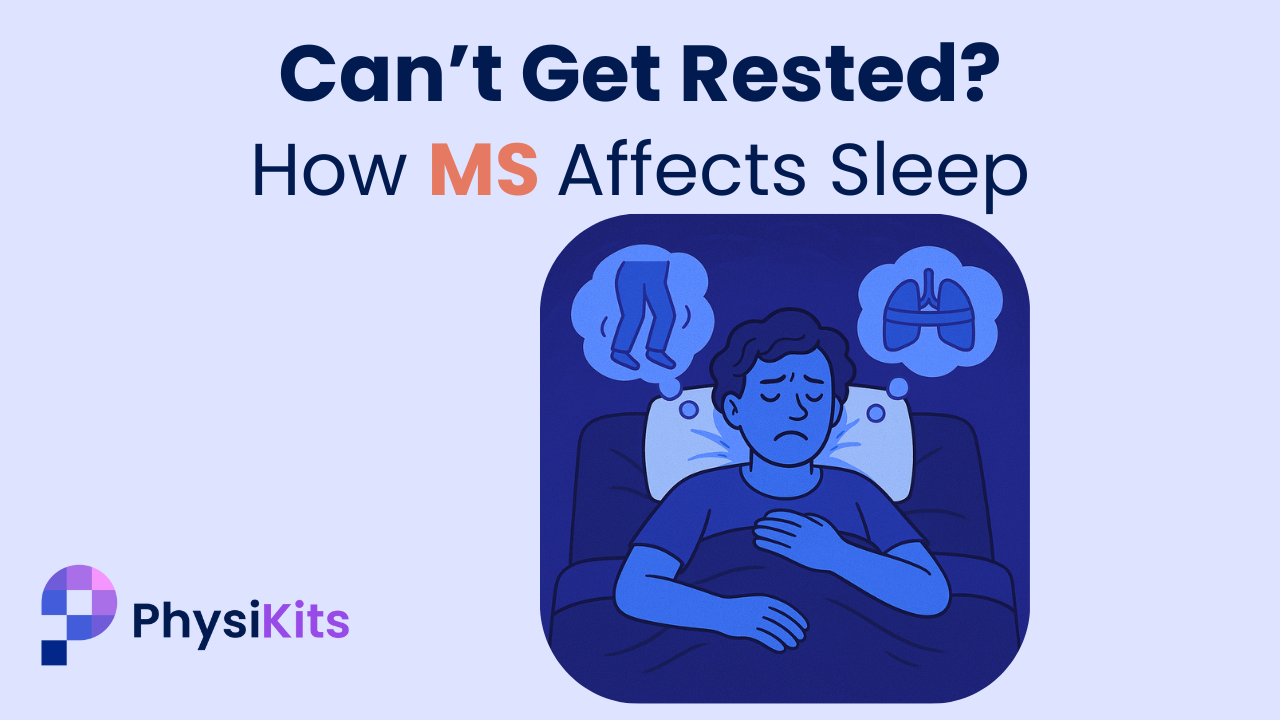
Can't Get Rested? How MS Affects Sleep
Aug 11, 2025Sleep plays a vital role in how we feel, think, move, and function. For people living with multiple sclerosis (MS), sleep problems are common, but they’re often overlooked.
You might notice you’re waking up tired, feeling foggy during the day, or lying in bed for hours without falling asleep. These sleep changes are real, and they’re not always caused by stress or poor sleep habits. Many are directly linked to how MS affects the brain and body.
In this blog, we’ll explore the most common sleep problems in MS, how they connect with fatigue, and what you can do to start improving your sleep today.
Common Sleep Problems in MS
More than half of people with MS experience disturbed sleep. Here are some of the most frequent culprits, according to research by Bradley & Boudreau (2016):
Insomnia
Trouble falling or staying asleep is often linked to symptoms like pain, muscle spasms, bladder urgency, or anxiety. Even medications such as beta-interferons or stimulants may play a role. Sometimes there’s no clear trigger—it simply becomes a frustrating nightly pattern.
Obstructive Sleep Apnoea (OSA)
OSA happens when the airway briefly collapses during sleep, leading to snoring, gasping, and repeated awakenings. In MS, this may be harder to recognise. People often report fatigue rather than feeling overtly sleepy, making it easier to miss. But it's important to recognise that fatigue can be caused by factors outside just MS!
Restless Legs Syndrome (RLS)
RLS causes uncomfortable leg sensations when resting, which are temporarily relieved by movement. It’s more common in people with MS, and can be confused with spasticity or nerve pain. This can lead to delays in diagnosis and treatment.
Is a Sleep Study Worth It?
A sleep study can help diagnose underlying problems like OSA or central sleep apnoea. In these cases, devices designed to help you breathe at night (e.g., CPAP) prescribed by your doctor can have massive benefits on both your sleep, and overall health!
Consider speaking to your doctor about a referral if you notice:
Loud snoring, choking or gasping during sleep
Morning headaches
Feeling completely unrefreshed after a full night in bed
Worsening fatigue despite plenty of rest
What You Can Try at Home
🛏️ Cool the Bed
Many people with MS are sensitive to heat, and sleeping too warm can interrupt deep sleep. Try a cooling mattress topper or lighter bedding—especially in warmer months. More ideas can be found in our Lifestyle Toolkit.
🏃 Get Puffing
Moderate daytime activity that leaves you slightly out of breath can improve sleep. It helps regulate the sleep cycle and builds respiratory strength, which is linked to better night-time breathing (Tzelepis & McCool, 2015).
Even light cardio or a brisk walk is enough to see benefits—no gym needed.
📖 Track What Affects Your Sleep
Sleep problems often have more than one cause. Keep a short diary to see how things like fluid intake, stress, pain, or medications may be affecting your nights. A few small changes—such as reducing evening fluids or adjusting your routine—can make a difference.
And yes, putting your phone away earlier really does help. Blue light released by modern screens delays melatonin release and can interfere with falling asleep.
You Don’t Have to Settle for Poor Sleep
Sleep problems often go unnoticed in MS, but they’re not something you just have to live with. Identifying and treating them can make a big impact on your energy, mood, and daily function.
If your fatigue feels worse than expected, or if you’ve already addressed pain, stress and pacing without much improvement, take a closer look at your sleep.
It’s worth raising with your GP or Neurologist.. There are always options—whether that’s a sleep study, assisted breathing machines (e.g., CPAP), trialing medications, or small changes at home.
🔗 Take Your Next Step with the MS PhysiKit
Our MS PhysiKit covers trouble with sleep in a few ways:
The Lifestyle Toolkit: Explores how temperature, sleep hygeine, and other factors influence your sleep.
The Fatigue Toolkit: Teaches you how to track energy patterns and symptoms over time. It’s a simple but powerful way to understand how sleep and fatigue are linked.
The Stress Toolkit: Practicing body-relaxation techniques before bed can help calm an overactive nervous system, making it easier to fall asleep.
Better sleep doesn’t happen overnight, but small steps can make a big difference.
Reference
Braley, T. J., & Boudreau, E. A. (2016). Sleep disorders in multiple sclerosis. Current neurology and neuroscience reports, 16(5), 50. https://doi.org/10.1007/s11910-016-0649-2
Tzelepis, G. E., & McCool, F. D. (2015). Respiratory dysfunction in multiple sclerosis. Respiratory medicine, 109(6), 671-679. https://doi.org/10.1016/j.rmed.2015.01.018
Stay Informed!
News, updates, and science delivered to your inbox.
We will never sell your information, for any reason.

